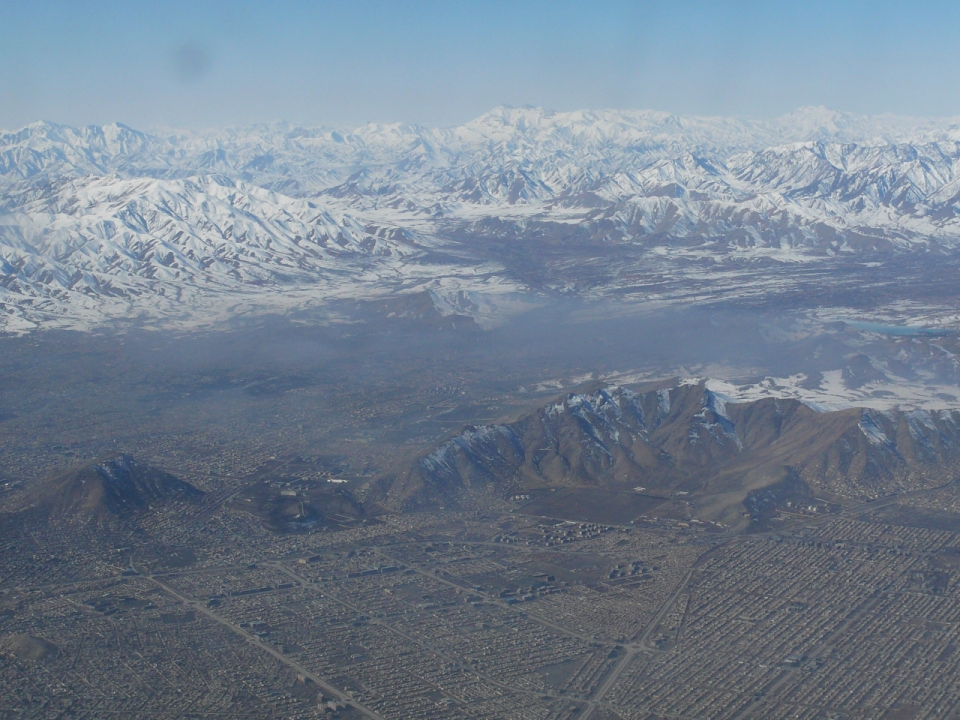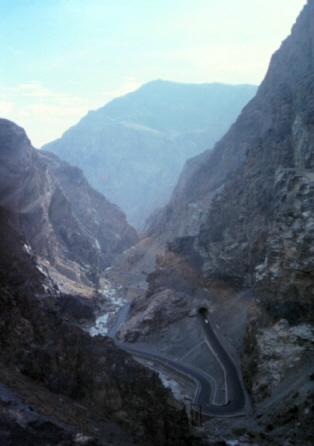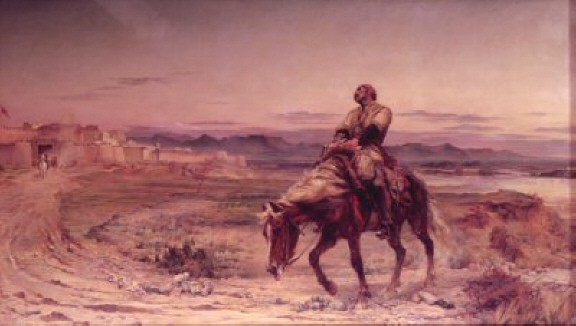|
The murder of Burnes and his entourage (Mohan Lal escaped
and would continue to aid the British) galvanized the Army into
action. Brigadier Shelton took a small force and occupied the Bala
Hissar, with instructions to fire on the city and attempt to divert, if
not repulse the insurrection. After several days, the Afghans became
even more incensed, and surrounded the Bala Hissar.
The supplies (food, clothing, etc) for the thousands of men.
their families, and the camp
followers based in the cantonment were kept in a fort about
three-quarters of a mile away
- it soon came under attack, and was defended by an Ensign Warren and
about a hundred men. After a few days of furious fighting observed from
the cantonment, Elphinstone finally realized that he should do
something, and called a meeting. A night relief force was organized
which, true to form, didn't get going until after daybreak, but they
were astounded, as they marched from the cantonment, to find Warren and
his survivors coming forward to meet them. He'd abandoned the
commissariat and all their supplies.
Fighting continued back and forth. Elphinstone recalled Shelton from
the Bala Hissar. Shelton appears to have been nearly as old as
Elphinstone, a cantankerous and argumentative general of limited
ability. The two had been bitter enemies all along, Elphinstone complaining that
Shelton didn't pay him the respect due his office, and Shelton
complaining that Elphinstone was an idiot. They were both right,
apparently.
Macnaghten realized that their only hope lay in General Sale's force
at Jalalabad, which he contacted and asked for their immediate return to
Kabul, but Sale was smart enough to realize that would be idiocy to
attempt a winter passing of the Khurd-Kabul pass with his own bevy of
wounded soldiers and lack of any real armaments. By now Shelton, Macnaghten and Elphinstone
were at each other's throats. They did manage to take back a small fort
near the cantonment and recover about 20 tons of wheat, but this was
their only success.
The Afghans - mostly tribes of the Ghilzai clan - occupied the
heights surrounding the cantonment and started peppering the exposed
town with rifle and cannon fire. Shelton urged an attack, Elphinstone
wavered back and forth, and wouldn't order the army to fight until Macnaghten took the
responsibility. Macnaghten, loathe to admit his abject failure in the
mission, blamed Elphinstone and Shelton for the pitiful showing of the
Army. The men themselves grew more hopeless every day, being under
constant sniper fire, running short on food, and helplessly watching the
Afghans loot, burn and destroy the city and outlying areas. Once, the British marched out in their formal columns, upon
which the Afghan cavalry rode down and cut them to pieces in full
view of the horrified wives and family behind in the cantonment. Lady
Florentia Sale, wife of General Sale, watched in horror as
the British were cut to pieces. They managed to fight their way to the Ghilzai
guns and capture one and destroy the other, at fearful losses. Her
diary of the conflict and subsequent events ranks as one of the most
amazing war recollections of all time.
By late November, the entire north of Afghanistan was in revolt.
Macnaghten urged moving the force to the Bala Hissar, but was argued
against it by Shelton and Elphinstone, who thought the idea madness, and
complained that moving the women, children, elderly and wounded would
open them to Afghan fire. They wanted to retreat to India, but
Macnaghten would have none of that, obviously. Shelton and a force
attacked the nearby village of Bemaru to control the heights around the
cantonment. The Afghans once again cut them to pieces. He was
later accused of fighting the mountain warriors the same way he'd fought
at Waterloo against the French - forming up nice neat squares of
infantry to resist Napoleon's cavalry. He presented marvelous,
red-jacketed targets to the best marksmen in the world and was lucky to
escape with his own life, being hit five times by shot. Towards the end,
he stepped back a few feet to give an order, was thought to be ordering
the retreat, and was nearly trampled by his own troops streaming back to
the cantonment in confusion. Thus ended their "exterior
operations", as Shelton himself called them.
By now, Palmerston back in Calcutta had heard of the emergency, and
he immediately went into a funk and refused to take any decisive
action. He reasoned that if the Government of India sent more
troops, they would only get in the way, and besides, if there is going
to be a disaster, more men would only increase the depth of the
disaster. He wrote Sir Jasper Nicholls, new Commander-in-Chief
of the army, "it was the wrong time of year to go to Kabul."
Dost Mohammed's son, Akbar Khan now arrived on
the scene. Bold, patriotic, and courageous, many of the tribes looked to
him as their leader. Macnaghten met with Akbar and suggested a
cease-fire to allow the British to withdraw, hard concessions for the
formerly arrogant political agent. Akbar seemed to go along with this
idea, but a few days later another offer came from his camp.
Purportedly, he suggested that his rebels and the British join forces,
eliminate the other chiefs, and he and the British would rule in tandem,
with or without Shah Shujah.
Despite the timing, and the incredibly suspect
double-cross, two days before Christmas Macnaghten rode out to the Kabul
River bank to meet Akbar. Dressed, as usual, in his silk hat and frock
coat, he was accompanied by three British officers. Once the British
envoy dismounted, Akbar shouted "Seize them!" Macnaghten,
horrified, was dragged away by Akbar's men. One officer was dragged from
his horse and cut to pieces immediately, the other two were taken
prisoner. Macnaghten was probably shot with the same pistols he had
given to Akbar Khan as a gift just days earlier. Later in the day,
the two imprisoned officers were horrified to look out from their
jail and see Macnaghten's head being triumphantly carried through the
streets on a lance, the armless and legless torso not far behind. (This
scene was repeated most recently in 1995 when the Taliban militants executed
Najibullah, the Soviet-installed communist leader, and hoisted his body
on a meat-hook in the Kabul bazaar.
Major Eldred Pottinger, British hero of the siege of
Herat earlier, was made senior Political Officer. Badly wounded in
fighting in northern Kohistan, he was, in his words, "obligated to
negotiate for the safety of a parcel of fools who were doing all they
could to assure their own destruction." Akbar made his last offer
to the British - the Army could withdraw to India, with Akbar himself as
an escort. They would leave behind their treasury, all but six cannon,
and all the married officers and their families. Pottinger argued for
rejection. Mohan Lal offered the news that Akbar was treacherous and not
to be trusted, the hostages used merely to safeguard his own father in
India. Pottinger was overruled, Mohan Lal ignored, (he was, after all, a
"wog") and Shah Shujah was
told to fend for himself, the Army of the Indus was leaving Afghanistan.
Elphinstone handed over the treasury and 130 hostages.

Aerial View, looking east from Kabul towards
Jalalabad.
January 6th, 1842 saw almost 5000 troops, wives
and children trudge from the cantonment, followed by over 12,000 camp
followers. Ladys Macnaghten and Sale were among them. They were headed
for high mountain passes through narrow trails, during the bitter and deadly
Afghan winter, with only the clothes on their backs. The safety of India
was over 100 miles away. That day, 10 inches of snow fell. As the column
straggled away from the cantonment, they could turn and watch it being
put to the flame by the Afghans. Akbar's promised escort never
showed up. Shah Shujah watched the retreat from a room in the Bala
Hissar - knowing he too was now doomed.
Words can not express the horror and hardships
faced by this wretched column of humanity, most of whom were
non-combatants and innocent women and children. The thousands of camp
followers, mostly Indian families and women and children, had no
shelter, food or arms. The first days march by the bedraggled column
made only five miles. Wading through thigh-deep snow, the camels died by
the score. Ponies had to have ice hammered from their hooves. On the first night
alone, nearly 1200 perished from the cold or the ceaseless sniping from
the tribes' rifles. Virtually every inch of the route home lay through
narrow, winding mountain passes, commanded by rocky heights populated by
enraged Ghilzai tribes.

A Sample of the route from Kabul to Jalalbad
Repeatedly, Akbar was met with by British
officers who complained of the shooting and looting, but Akbar demurred,
claiming he could not control the Ghilzai. He offered sanctuary for
women and children, but most of those who took him up on the offer were
never seen again. On January 8th, at the foot of the Khurd-Kabul
pass, Army officer Vincent Eyre noted in his diary, "The idea
of threading the stupendous pass, in the face of an armed tribe of
blood-thirsty barbarians, with such a dense, irregular multitude, was
frightful.." A narrow stream ran down the center of the pass,
but despite the cold, it was not frozen over, and the path crossed it
several dozen times. Ice and snow covered the trail. As the column entered the
pass, the rifle fire from above started. Before long, horses, camels,
men , women and children lay dead or dying in the snow. Lady Sale and her party,
most of whom were on horseback, galloped ahead and most of them escaped.
Other women were not so fortunate. As their camels died, they had to
abandon them and carry on on foot, carrying babies. Hundreds died, shot
from above or from the rear attack parties, falling to die or freeze in
the snow and ice.
That night, the camp was nothing but a hellish
place. Wounded people straggled in, many with mortal injuries, including
Lieutenant Sturt, husband of Lady Sale's daughter. There was no food or
drink, little shelter, and many of the weak and wounded froze to death
overnight. When Lady Sale looked out of her tent the next morning,
it was surrounded by frozen corpses. The column started off again, then
stopped, then started again, each time confusion increased by Akbar's
pleas to halt so he could "protect" it, and
Elphinstone's muddled leadership. During one halt, Lieutenant Sturt died
of his wounds, and was buried in the snow by Lady Sale and her daughter.
Towards noon, Akbar offered to take under his
protection "the widowed ladies and married families",
promising to escort them personally behind the main column.
Elphinstone was finally convinced, and several dozen women, children,
wounded officers, and others moved off to the Khurd-Kabul
fort where rooms were given them, Lady Sale and her party among them.
They were given some food, but had no bedding or any warm
clothing. Not all the women and children reached the safety of the
fort, however. Around midnight a young boy, covered in blood, was
brought in, having been rescued from tribesmen who were taking him up to
the hills. His mother was never seen again.
On
the 11th of January, what was left of the column reached the village of
Tizin. Eyre estimated that 12,000 people had died in less than a week,
and they weren't half way to the relative safety of General Sale's force
at Jalalabad. At Jagdalak, more fighting ensued, the few British troops
still able to fire their weapons bravely resisting the rifles and long
knives of the mounted Afghan tribesmen. Brigadier Shelton, manning the
rear guard, is noted in most histories as being particularly gallant and
courageous with his small detachment. That night, Akbar, through the
tireless messenger Captain Skinner, requested Elphinstone's presence at
a meeting, along with General Shelton and other officers. Hesitant, yet
hoping that Akbar would for once be honorable, the senior British
officers rode off to Akbar's camp. He received them with courtesy, but
could barely restrain the Afghan tribesmen surrounding the
English.
Disheartened at their leaders disgrace,
demoralized, starved and wounded, the column waited a day for
Elphinstone's order, but none came. He and Shelton were cut off from
their men. As the sun came up on the 13th, the force approached the
hills of Gandamak, thirty miles from Jalalabad
The surviving members of the 44th Foot
Light Infantry stood their ground as the tribesmen swarmed around them,
but gradually, were cut down. The massacre at Gandamak was the end of
the British Army of the Indus. The bones of the men who fell at Gandamak
can still be found there, in makeshift graves, a stone marker noting the
battle.
A few mounted officers managed to escape
the massacre, pursued by tribesmen. Each was in turn caught, engaging in
hand to hand combat with the enemy until overpowered.
The last, Doctor William Brydon, a surgeon in
the Bengal Army, his head and hands
cut from sabre slashes, and shot three times, rode his faithful pony as fast
as it would carry him. At one point, he actually threw the hilt of
his broken sword at a pursuer, the useless weapon grazing the Afghan's
head and causing him to turn and wheel away. Exhausted and wounded, the pony stumbled on. Late in the day on the 13th of
January, a sharp eyed sentry at the fort in Jalalabad spied a lone horse
and rider emerging from the rocky valley above the fort. That solitary rider was the
messenger of death. With the exception of two or three Indian sepoys, the prisoners and senior
officers Elphinstone, Shelton, Pottinger, and Eyre, along with Lady Sale
and a few other women and children, he was the only survivor of the over
16,000 souls who had left Kabul barely a week earlier.

Lady Elizabeth Butler, "Remants of An Army"
|